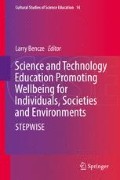Abstract
Situated in a large urban high school, we describe, using Actor-Network Theory (ANT), the subject positions that emerge when students are faced with the tasks of identifying a personally relevant STSE issue and devising strategic sociopolitical actions to affect said issues. As such, we consider how various human and non-human actors interact in our varying networks of relation, in which STEPWISE as an activist pedagogical framework structures capacities for ethical engagement through praxis. As students were faced with the tensionality binding local and global perspectives, we observed their often ambivalent maneuvers navigating this dyad to contextualize and localize their research informed activism within in their communities and daily lives. More specifically, we offer commentaries on how students problematize an STSE issue, how they are interessed, or positioned by a digital medium of communication (the Wiki) and finally and how they mobilize their actions to affect change.
Access this chapter
Tax calculation will be finalised at checkout
Purchases are for personal use only
References
Bencze, J. L., Alsop, S., & Bowen, G. M. (2009). Student-teachers’ inquiry-based actions to address socioscientifc issues. Journal for Activist Science and Technology Education, 1(2).
Bencze, J. L., & Carter, L. (2011). Globalizing students acting for the common good. Journal of Research in Science Teaching, 48(6), 648–669.
Bencze, J. L., Sperling, E., & Carter, L. (2012). Students’ research-informed socio-scientific activism: Re/visions for a sustainable future. Research in Science Education, 42(1), 129–148.
Bigham, D. J. II. (2013). Hearing connections: An actor-network study of online guitar activities (Order No. 3557205, University of California, San Diego). ProQuest Dissertations and Theses (pp. 1–213).
Bryant, A., & Charmaz, K. (2007). Grounded theorizing using situational analysis. In A. Bryant & K. Charmaz (Eds.), The SAGE handbook of grounded theory (pp. 362–398). London: Sage.
Calás, M. B., & Smircich, L. (1999). Past postmodernism?: Reflections and tentative directions. The Academy of Management Review, 24(4), 649–671.
Callon, M. (1986a). Some elements in a sociology of translation: Domestication of the scallops and the fishermen of St. Brieuc Bay. In J. Law (Ed.), Power, action and belief (pp. 196–223). London: Routledge.
Callon, M. (1986b). The sociology of an actor-network: The case of the electric vehicle. In M. Callon, J. Law, & A. Rip (Eds.), Mapping the dynamics of science and technology: Sociology of science in the real world (pp. 19–34). London: Macmillan.
Charmaz, K. (2000). Grounded theory: Objectivist and constructivist methods. In N. K. Denzin & Y. S. Lincoln (Eds.), Handbook of qualitative research (pp. 509–535). Thousand Oaks: Sage.
Corbin, J., & Strauss, A. (2008). Basics of qualitative research (3rd ed.): Techniques and procedures for developing grounded theory. Thousand Oaks, CA: Sage.
Kaplan, A. M., & Haenlein, M. (2010). Users of the world, unite!: The challenges and opportunities of social media. Business Horizons, 53(1), 59–68.
Latour, B. (1999). On recalling ANT. The Sociological Review, 47(S1), 15–25.
Latour, B. (2005). Reassembling the social: An introduction to actor-network-theory. Oxford, UK: Oxford University Press.
Law, J. (1992). Notes on the theory of the actor-network: Ordering, strategy, and heterogeneity. Systems Practice, 5(4), 379–393.
Law, J. (2006). Traduction/Trahison: Notes on ANT. Convergencia. Revista de Ciencias Sociales, 42(13), 47–72.
Law, J. (2009). Actor network theory and material semiotics. In B. Turner (Ed.), The new Blackwell companion to social theory (pp. 141–158). West Sussex, UK: Blackwell.
Lincoln, Y. S., & Guba, E. G. (2000). Paradigmatic controversies, contradictions, and emerging confluences. In N. K. Denzin & Y. S. Lincoln (Eds.), Handbook of qualitative research (pp. 163–188). Thousand Oaks, CA: Sage.
Pedretti, E., & Nazir, J. (2011). Currents in STSE education: Mapping a complex field, 40 years on. Science Education, 95(4), 601–626.
Singleton, V., & Michael, M. (1993). Actor-networks and ambivalence: General practitioners in the UK cervical screening programme. Social Studies of Science, 23(2), 227–264.
Tatnall, A., & Burgess, S. (2002). Using actor-network theory to research the implementation of a BB portal for regional SMEs in Melbourne, Australia. In 15th Bled Electronic Commerce Conference-‘eReality: Constructing the eEconomy’. Bled, Slovenia: University of Maribor.
Wong, L., & Tatnall, A. (2010). Factors determining the balance between online and face-to-face teaching: An analysis using actor-network theory. Interdisciplinary Journal of Information, Knowledge, and Management, 5, 167–176.
Zoras, B., & Bencze, L. (2014). Utilizing social media to increase student-led activism on STSE issues. In L. Bencze & S. Alsop (Eds.), Activist science & technology education (pp. 435–449). Dordrecht, The Netherlands: Springer.
Acknowledgements
We would like to thank the wonderful class for all your hard work and commitment and in particular those students and parents that gave their consent to be represented by us in this text. This chapter could not have been written without the passion and dedication that you all have. Additionally, we are grateful to the Social Sciences and Humanities Research Council, Canada, for their generous funding of research about this case.
Author information
Authors and Affiliations
Corresponding author
Editor information
Editors and Affiliations
Rights and permissions
Copyright information
© 2017 Springer International Publishing AG
About this chapter
Cite this chapter
Ramjewan, N.T., Zoras, B., Bencze, L. (2017). Giving Meaning to STSE Issues Through Student-Led Action Research: An Actor-Network Theory Account of STEPWISE in Action. In: Bencze, L. (eds) Science and Technology Education Promoting Wellbeing for Individuals, Societies and Environments. Cultural Studies of Science Education, vol 14. Springer, Cham. https://doi.org/10.1007/978-3-319-55505-8_12
Download citation
DOI: https://doi.org/10.1007/978-3-319-55505-8_12
Published:
Publisher Name: Springer, Cham
Print ISBN: 978-3-319-55503-4
Online ISBN: 978-3-319-55505-8
eBook Packages: EducationEducation (R0)

